Xueyan Li
From Perception to Punchline: Empowering VLM with the Art of In-the-wild Meme
Dec 31, 2025Abstract:Generating humorous memes is a challenging multimodal task that moves beyond direct image-to-caption supervision. It requires a nuanced reasoning over visual content, contextual cues, and subjective humor. To bridge this gap between visual perception and humorous punchline creation, we propose HUMOR}, a novel framework that guides VLMs through hierarchical reasoning and aligns them with group-wise human preferences. First, HUMOR employs a hierarchical, multi-path Chain-of-Thought (CoT): the model begins by identifying a template-level intent, then explores diverse reasoning paths under different contexts, and finally anchors onto a high-quality, context-specific path. This CoT supervision, which traces back from ground-truth captions, enhances reasoning diversity. We further analyze that this multi-path exploration with anchoring maintains a high expected humor quality, under the practical condition that high-quality paths retain significant probability mass. Second, to capture subjective humor, we train a pairwise reward model that operates within groups of memes sharing the same template. Following established theory, this approach ensures a consistent and robust proxy for human preference, even with subjective and noisy labels. The reward model then enables a group-wise reinforcement learning optimization, guaranteeing providing a theoretical guarantee for monotonic improvement within the trust region. Extensive experiments show that HUMOR empowers various VLMs with superior reasoning diversity, more reliable preference alignment, and higher overall meme quality. Beyond memes, our work presents a general training paradigm for open-ended, human-aligned multimodal generation, where success is guided by comparative judgment within coherent output group.
SafeWork-R1: Coevolving Safety and Intelligence under the AI-45$^{\circ}$ Law
Jul 24, 2025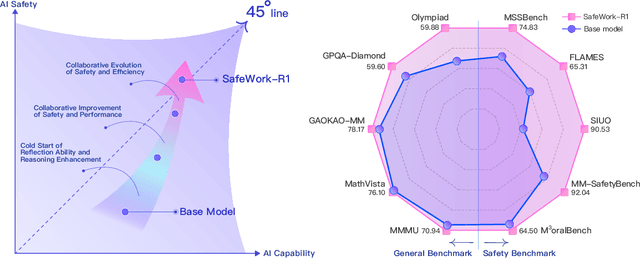
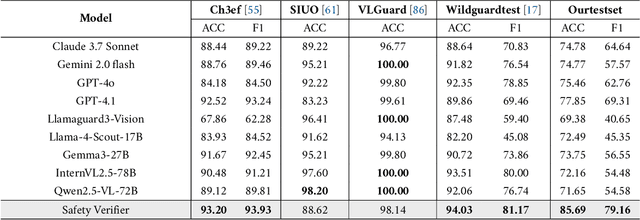
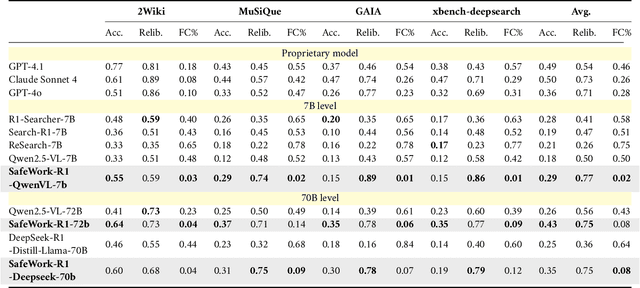

Abstract:We introduce SafeWork-R1, a cutting-edge multimodal reasoning model that demonstrates the coevolution of capabilities and safety. It is developed by our proposed SafeLadder framework, which incorporates large-scale, progressive, safety-oriented reinforcement learning post-training, supported by a suite of multi-principled verifiers. Unlike previous alignment methods such as RLHF that simply learn human preferences, SafeLadder enables SafeWork-R1 to develop intrinsic safety reasoning and self-reflection abilities, giving rise to safety `aha' moments. Notably, SafeWork-R1 achieves an average improvement of $46.54\%$ over its base model Qwen2.5-VL-72B on safety-related benchmarks without compromising general capabilities, and delivers state-of-the-art safety performance compared to leading proprietary models such as GPT-4.1 and Claude Opus 4. To further bolster its reliability, we implement two distinct inference-time intervention methods and a deliberative search mechanism, enforcing step-level verification. Finally, we further develop SafeWork-R1-InternVL3-78B, SafeWork-R1-DeepSeek-70B, and SafeWork-R1-Qwen2.5VL-7B. All resulting models demonstrate that safety and capability can co-evolve synergistically, highlighting the generalizability of our framework in building robust, reliable, and trustworthy general-purpose AI.
Empowering LLMs in Decision Games through Algorithmic Data Synthesis
Mar 18, 2025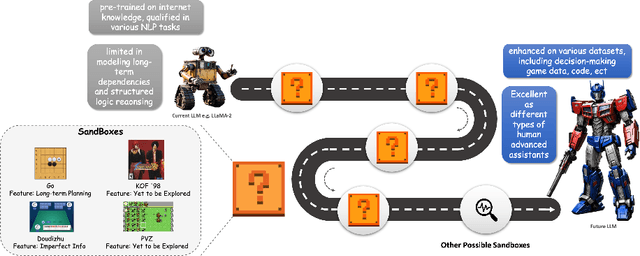

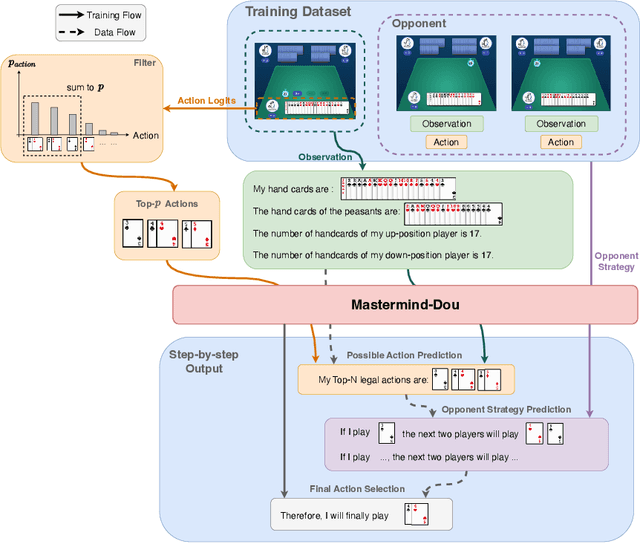

Abstract:Large Language Models (LLMs) have exhibited impressive capabilities across numerous domains, yet they often struggle with complex reasoning and decision-making tasks. Decision-making games, which inherently require multifaceted reasoning logic, serve as ideal sandboxes for evaluating and enhancing the reasoning abilities of LLMs. In this work, we first explore whether LLMs can master complex decision-making games through targeted post-training. To this end, we design data synthesis strategies and curate extensive offline datasets from two classic games, Doudizhu and Go. We further develop a suite of techniques to effectively incorporate this data into LLM training, resulting in two novel agents: Mastermind-Dou and Mastermind-Go. Our experimental results demonstrate that these Mastermind LLMs achieve competitive performance in their respective games. Additionally, we explore whether integrating decision-making data can enhance the general reasoning abilities of LLMs. Our findings suggest that such post-training improves certain aspects of reasoning, providing valuable insights for optimizing LLM data collection and synthesis strategies.
PsyDI: Towards a Personalized and Progressively In-depth Chatbot for Psychological Measurements
Jul 22, 2024Abstract:In the field of psychology, the static nature and lack of customization of psychological test scales, along with the challenge of quantifying psychological indicators, have long been critical issues. Despite numerous attempts to use AI to address psychological challenges, a dynamically interactive psychological test has yet to emerge. In contrast to traditional psychological assessment methods, we propose PsyDI, a multi-modal, interactive, and customized chatbot for psychological assessments, using the Myers-Briggs Type Indicator (MBTI) as an example. PsyDI initiates with user-related multi-modal information, then engaging in customized interaction to discern the user's MBTI type based on their multiple rounds of responses. Despite these advancements, accurately quantifying absolute value of psychological indicators remains challenging. To tackle such difficulty, we introduce the PsyDI framework that trains LLMs to discern the relative magnitude of psychological traits rather than their absolute values. Through various experiments, we demonstrate the effectiveness of the training techniques proposed in PsyDI on various datasets, and we have also launched its web version, reaching about ~3k accesses. Additionally, comprehensive post-deployment data analysis has provided profound insights into the implications and applications of PsyDI, demonstrating its potential to serve as a general framework for psychological assessment.
LightZero: A Unified Benchmark for Monte Carlo Tree Search in General Sequential Decision Scenarios
Oct 12, 2023



Abstract:Building agents based on tree-search planning capabilities with learned models has achieved remarkable success in classic decision-making problems, such as Go and Atari. However, it has been deemed challenging or even infeasible to extend Monte Carlo Tree Search (MCTS) based algorithms to diverse real-world applications, especially when these environments involve complex action spaces and significant simulation costs, or inherent stochasticity. In this work, we introduce LightZero, the first unified benchmark for deploying MCTS/MuZero in general sequential decision scenarios. Specificially, we summarize the most critical challenges in designing a general MCTS-style decision-making solver, then decompose the tightly-coupled algorithm and system design of tree-search RL methods into distinct sub-modules. By incorporating more appropriate exploration and optimization strategies, we can significantly enhance these sub-modules and construct powerful LightZero agents to tackle tasks across a wide range of domains, such as board games, Atari, MuJoCo, MiniGrid and GoBigger. Detailed benchmark results reveal the significant potential of such methods in building scalable and efficient decision intelligence. The code is available as part of OpenDILab at https://github.com/opendilab/LightZero.
FastCover: An Unsupervised Learning Framework for Multi-Hop Influence Maximization in Social Networks
Oct 31, 2021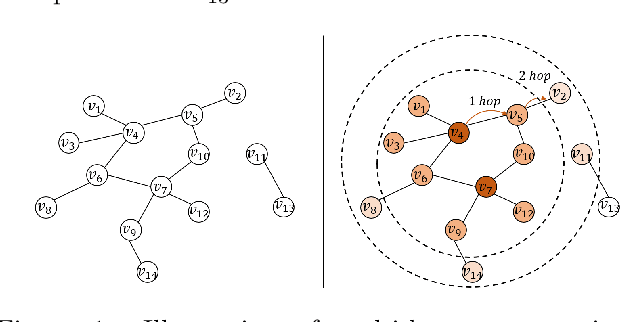
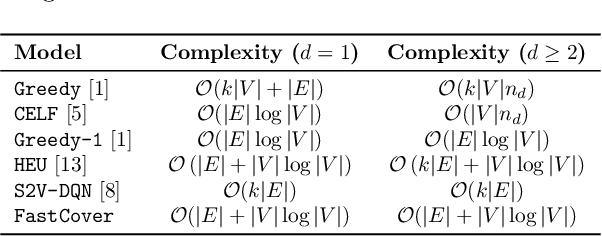
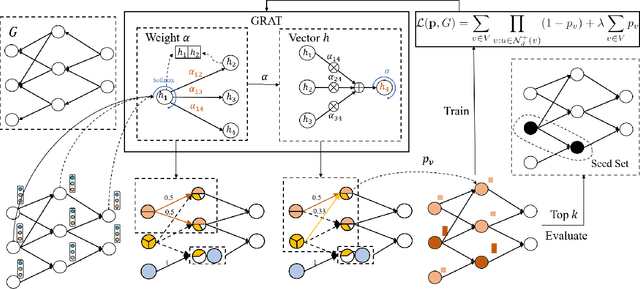

Abstract:Finding influential users in social networks is a fundamental problem with many possible useful applications. Viewing the social network as a graph, the influence of a set of users can be measured by the number of neighbors located within a given number of hops in the network, where each hop marks a step of influence diffusion. In this paper, we reduce the problem of IM to a budget-constrained d-hop dominating set problem (kdDSP). We propose a unified machine learning (ML) framework, FastCover, to solve kdDSP by learning an efficient greedy strategy in an unsupervised way. As one critical component of the framework, we devise a novel graph neural network (GNN) architecture, graph reversed attention network (GRAT), that captures the diffusion process among neighbors. Unlike most heuristic algorithms and concurrent ML frameworks for combinatorial optimization problems, FastCover determines the entire seed set from the nodes' scores computed with only one forward propagation of the GNN and has a time complexity quasi-linear in the graph size. Experiments on synthetic graphs and real-world social networks demonstrate that FastCover finds solutions with better or comparable quality rendered by the concurrent algorithms while achieving a speedup of over 1000x.
 Add to Chrome
Add to Chrome Add to Firefox
Add to Firefox Add to Edge
Add to Edge